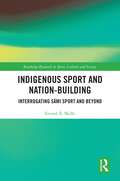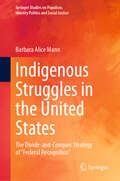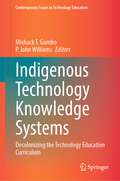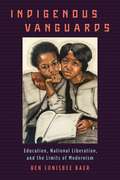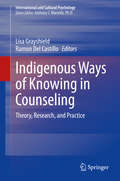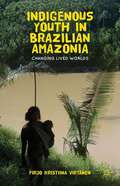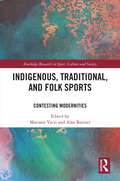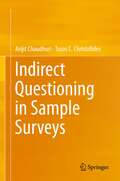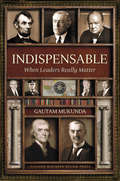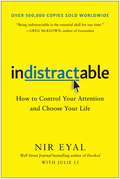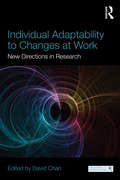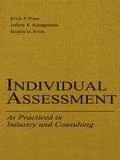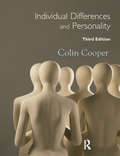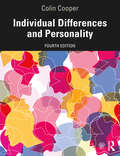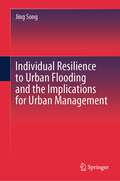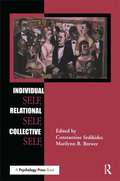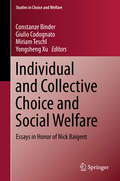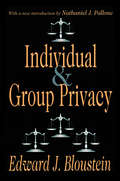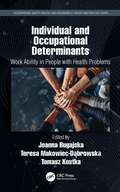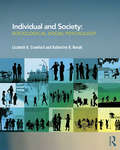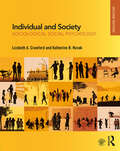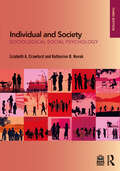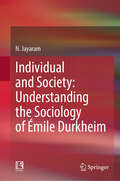- Table View
- List View
Indigenous Sport and Nation-Building: Interrogating Sámi Sport and Beyond (Routledge Research in Sport, Culture and Society)
by Eivind Å. SkilleThis book investigates the social, political, and cultural dimensions of Indigenous sport and nation-building. Focusing on the Indigenous Sámi of Norway, Sweden, Finland, and Russia, it addresses how colonization variously impacts organizational arrangements and everyday sporting life in a modern world. Through detailed case data from the Norwegian side of Sápmi (the land of the Sámi), this book provides a critical and contemporary perspective of post-colonial influences and their impacts on sport. The study uses concepts of conventions, citizenship and communities, to examine the tenuous roles of Indigenous-based sport organizations and clubs towards the building of an Indigenous nation. The book further draws together international, national, and local Sámi experiences to address the communal and assimilative influences that sport brings for people in the North Calotte. Taken together, the book signals the importance of sport in future community development and the (re)emergence of Indigenous culture. Appealing to policy makers and scholars alike, the book will be of particular interest to researchers in sport sociology, Indigenous studies and post colonialism. It also provides essential insight for public officials and administrators of sport and/or Indigenous issues at various levels of public office.
Indigenous Struggles in the United States: The Divide-and-Conquer Strategy of "Federal Recognition" (Springer Studies on Populism, Identity Politics and Social Justice)
by Barbara Alice MannThis book sheds light on the intricate history of Indigenous America's struggle for identity and sovereignty. Examining the utilization of a divide-and-conquer strategy through "federal recognition" in the United States, the book offers a profound analysis of the tactics employed by the U.S. government to subdue Indigenous peoples. From the early days of American colonization, the U.S. sought to eliminate Indigenous competition for land, leading to a complex interplay of alliances and divisions within Indigenous communities. This book investigates the government's systematic efforts to redefine racial identity, ultimately erasing Indigenous people from official records. The book calls for a reclamation of Indigenous America's narrative, emphasizing the importance of self-representation and unity. This compelling work challenges readers to confront the enduring consequences of historical injustices and rethink the concept of identity in a rapidly changing world.
Indigenous Technology Knowledge Systems: Decolonizing the Technology Education Curriculum (Contemporary Issues in Technology Education)
by P. John Williams Mishack T. GumboThere has been a growing interest in indigenous knowledge systems and research. This interest has been mainly triggered by the need to decolonize education as a response to the colonial onslaught on indigenous knowledge and people. Research has, however, concentrated on the generality of the indigenous knowledge system rather than on its related dimensions. One area that has suffered a lack of attention is indigenous conceptions of science, technology, engineering, and mathematics (STEM) despite the unquestionable evidence of STEM in indigenous contexts. Most STEM is presented by colonial establishments and representations, especially in developed/modern/urban contexts, which portray STEM as a colonial construct. This book focuses on indigenous technological knowledge systems education (ITKSE). Indigenous people have been at the front of technological developments from pre-colonial times. The list of precolonial industries, science, and technology is extensive, including blacksmithing, wood-carving, textile-weaving and dyeing, leather works, beadworks, pottery making, architecture, agricultural breeding, metal-working, salt production, gold-smithing, copper-smithing, leather-crafting, soap-making, bronze-casting, canoe-building, brewing, glass-making, and agriculture, for example. In some parts of the world such as Africa and Australia, these technologies still exist. ITKSE should not be left to exist outside of the technology education curriculum and classroom as it can benefit both indigenous students, who have been denied learning about what is relevant to them, and non-indigenous students. These cultural groups can expand their knowledge of technology by learning both ITKSE and Western technological knowledge systems education (WTKSE). ITKSE also presents opportunities for technology teachers to reflect on and revisit their depth of technological knowledge, pedagogies, and assessment. The intent of this book is transformational in the sense that it brings decolonial and indigenous perspectives into the technology education context. It extends technology education in the sense that it will not only influence Western-minded architects, artisans, designers, etc. but encourage indigenous-mindedness as well.
Indigenous Vanguards: Education, National Liberation, and the Limits of Modernism (Modernist Latitudes)
by Ben Conisbee BaerAnticolonial struggles of the interwar epoch were haunted by the question of how to construct an educational practice for all future citizens of postcolonial states. In what ways, vanguard intellectuals asked, would citizens from diverse subaltern situations be equally enabled to participate in a nonimperial society and world? In circumstances of cultural and social crisis imposed by colonialism, these vanguards sought to refashion modern structures and technologies of public education by actively relating them to residual indigenous collective forms.In Indigenous Vanguards, Ben Conisbee Baer provides a theoretical and historical account of literary engagements with structures and representations of public teaching and learning by cultural vanguards in the colonial world from the 1920s to the 1940s. He shows how modernizing educative projects existed in complex tension with impulses to indigenize national liberation movements, and how this tension manifests as a central aspect of modernist literary practice. Offering new readings of figures such as Alain Locke, Léopold Senghor, Aimé Césaire, D. H. Lawrence, Rabindranath Tagore, Mahatma Gandhi, and Tarashankar Bandyopadhyay, Baer discloses the limits and openings of modernist representations as they attempt to reach below the fissures of class that produce them. Establishing unexpected connections between languages and regions, Indigenous Vanguards is the first study of modernism and colonialism that encompasses the decisive way public education transformed modernist aesthetics and vanguard politics.
Indigenous Ways of Knowing in Counseling: Theory, Research, and Practice (International and Cultural Psychology)
by Lisa Grayshield Ramon Del CastilloIndigenous Counseling is based in universal principals/truths that promote a way to think about how to live in the world and with one another that extends beyond the scope of Western European thought. Individual health and wellness is intricately interwoven into the relationships that we establish on multiple levels in our lives, those that we establish with ourselves, with others, and with the external environments with which we live. From an Indigenous perspective, health and wellness in our individual lives, families, community and world, is the result of ancient knowledge that produces action in a way that is beneficial to all beings on the planet for generations to come. The current social and political record of our country now clearly reveals the result of a paradigm that has outlived its time. No longer can we ignore the core values of our fields of study; we must take a deeper look into the academic endeavors that inform the way we pass our cultures’ values on to successive generations. While it has taken Western Science decades to catch up to Indigenous/Native Science, we now have ample scientific evidence to support claims of interconnectedness on multiple levels of individual and collective health.
Indigenous Youth in Brazilian Amazonia: Changing Lived Worlds
by Pirjo Kristiina VirtanenHow do Amazonian native young people perceive, question, and negotiate the new kinds of social and cultural situations in which they find themselves? Virtanen looks at how current power relations constituted by ethnic recognition, new social contacts, and cooperation with different institutions have shaped the current native youth in Amazonia.
Indigenous, Traditional, and Folk Sports: Contesting Modernities (Routledge Research in Sport, Culture and Society)
by Alan Bairner Mariann VacziThis is the first book to focus on indigenous, traditional, and folk sports and sporting cultures. It examines the significance of sporting cultures that have survived the emergence and diffusion of western sports and have carved out a unique position not only in spite of modernity but also in response to it. Presenting case studies from around the world, including from Europe, Asia, Africa, and the Americas, this book draws on multidisciplinary work from sociology, anthropology, history, cultural studies, and political science, exploring key themes in the social sciences including nationalism, identity, decolonisation, and gender. From Turkish oil wrestling, kabaddi in South Asia, Iroquois lacrosse, to wushu and sumo in East Asia and various European traditional sports, these sporting practices continue to capture the indigenous imagination on the margins of the western hegemonic sport complex. Situated in the fissures between the local, the national, and the global; between the archaic and the modern; and between ritual and record, they inhabit a liminal space of transformation as they assume new cultural and political meanings, offering important perspectives on the complexities and contradictions of modernity. The volume’s decolonial perspective lies in its promotion of indigenous and subaltern worldviews through their traditional movement cultures on the margins of the western hegemonic sport complex. This is a fascinating reading for anybody with an interest in sport, nationalism, Indigenous studies, heritage and folklore studies, anthropology, social and cultural history, or globalisation.
Indirect Questioning in Sample Surveys
by Tasos C. Christofides Arijit ChaudhuriIndirect questioning is a crucial topic in surveys of human populations. When the issue is about a stigmatizing characteristic (for example about illegal drug use), standard survey methodologies are destined to fail because, as expected, people are not willing to reveal incriminating information or information violating their privacy. Indirect questioning techniques have been devised so that the privacy of participants in a sample survey is protected and at the same time good estimates of certain parameters (e.g. the percentage of people in a certain community who use illegal drugs) can be delivered. The topic is modern and still under development. Indirect Questioning in Sample Surveys represents a collection of the most important and recent techniques of indirect questioning, including various versions of randomized response, the item count technique, the nominative technique, the three-card method, non-randomized response models and negative surveys, while also exploring the key aspect of protecting privacy.
Indispensable
by Gautam MukundaWill your next leader be insignificant-or indispensable?The importance of leadership and the impact of individual leaders has long been the subject of debate. Are they made by history, or do they make it?In Indispensable, Harvard Business School professor Gautam Mukunda offers an enticingly fresh look at how and when individual leaders really can make a difference. By identifying and analyzing the hidden patterns of their careers, and by exploring the systems that place these leaders in positions of power, Indispensable sheds new light on how we may be able to identify the best leaders and what lessons we can learn, from both the process and the result.Profiling a mix of historic and modern figures-from Thomas Jefferson and Abraham Lincoln to Winston Churchill and Judah Folkman-and telling the stories of how they came to power and how they made the most important decisions of their lives, Indispensable reveals how, when, and where a single individual in the right place at the right time can save or destroy the organization they lead, and even change the course of history.Indispensable will also help you understand this new model so you can use it in your own life-whether you're a citizen casting a ballot, an executive choosing your next CEO, or a leader trying to make your mark.
Indistractable: How to Control Your Attention and Choose Your Life
by Nir Eyal"Indistractable provides a framework that will deliver the focus you need to get results." —James Clear, author of Atomic Habits "If you value your time, your focus, or your relationships, this book is essential reading. I'm putting these ideas into practice." —Jonathan Haidt, author of The Righteous Mind National Bestseller Winner of the Outstanding Works of Literature (OWL) Award Included in the Top 5 Best Personal Development Books of the Year by Audible Included in the Top 20 Best Business and Leadership Books of the Year by Amazon Featured in The Amazon Book Review Newsletter, January 2020 Goodreads Best Science & Technology of 2019 Finalist You sit down at your desk to work on an important project, but a notification on your phone interrupts your morning. Later, as you're about to get back to work, a colleague taps you on the shoulder to chat. At home, screens get in the way of quality time with your family. Another day goes by, and once again, your most important personal and professional goals are put on hold. What would be possible if you followed through on your best intentions? What could you accomplish if you could stay focused? What if you had the power to become "indistractable?" International bestselling author, former Stanford lecturer, and behavioral design expert, Nir Eyal, wrote Silicon Valley's handbook for making technology habit-forming. Five years after publishing Hooked, Eyal reveals distraction's Achilles' heel in his groundbreaking new book. In Indistractable, Eyal reveals the hidden psychology driving us to distraction. He describes why solving the problem is not as simple as swearing off our devices: Abstinence is impractical and often makes us want more. Eyal lays bare the secret of finally doing what you say you will do with a four-step, research-backed model. Indistractable reveals the key to getting the best out of technology, without letting it get the best of us. Inside, Eyal overturns conventional wisdom and reveals: Why distraction at work is a symptom of a dysfunctional company culture—and how to fix it What really drives human behavior and why "time management is pain management" Why your relationships (and your sex life) depend on you becoming indistractable How to raise indistractable children in an increasingly distracting world Empowering and optimistic, Indistractable provides practical, novel techniques to control your time and attention—helping you live the life you really want.
Individual Adaptability to Changes at Work: New Directions in Research (Organization and Management Series)
by David ChanIndividual adaptability to changes at work refers to an individual’s response to new demands or ill-defined problems created by uncertainty, complexity, mergers, and any rapid change in the work situation. Today, one of the key factors for an individual’s success is said to be adaptability. In the past two decades there has been increasing interest in the research on individual adaptability, and this is one of the first academic volumes to look at this important topic. Specific contexts examined include work-family conflict, retirement, career management and intercultural interaction at the workplace. The book will provide a comprehensive and integrated analysis of the conceptual, assessment and contextual issues that will help identify the current trends and emerging themes in adaptability research.
Individual Assessment: As Practiced in Industry and Consulting (Applied Psychology Series)
by Kristin O. Prien Jeffery S. SchippmannIndividual Assessment is a professional practice important to Human Resource Managers, Executives and anyone making decisions about employees. Finally, we now have a clear, practical guide with methodologically-grounded descriptions of how to successfully do it. The authors have put together a unique new book with the following key features: *case studies and applied examples showing "how to" conduct individual assessment; *the book provides the reader with a conceptual structure and the research and literature supporting the process; and * it can be used as a text or supplemental text in courses on Personnel Selection, Assessment, Human Resources and Testing. This book will take Individual Assessment to an entirely new level of understanding and practice, and into a new era of professional research and activity.
Individual Differences and Personality
by Colin CooperColin Cooper's 'Individual Differences' has been a favourite among lecturers and students of differential psychology since it was published in 1997. It is unique in its comprehensive coverage of both personality theories and the methodological issues associated with personality and psychometric testing.This new edition has been fully revised and expanded to include recent developments in the field. There is also a new chapter on Emotional Intelligence and expanded coverage of the Big 5 model of personality and positive psychology. Cooper also discusses influential new fields such as cognitive epidemiology and a new chapter on practical applications demonstrates how what has been learned can be applied to everyday life from recruitment to predicting whether psychopaths will reoffend.The accompanying website provides comprehensive support for both students and lecturers, including MCQs, sample exam questions, PowerPoint presentations, revision flashcards, interactive glossary, and revision summaries.An informative and enjoyable trip through personality and psychometrics, this book is essential reading for all students wishing to gain a broad understanding of this fascinating field.
Individual Differences and Personality
by Colin CooperIndividual Differences and Personality provides a student-friendly introduction to both classic and cutting-edge research into personality, mood, motivation and intelligence, and their applications in psychology and in fields such as health, education and sporting achievement. Including a new chapter on 'toxic' personality traits, and an additional chapter on applications in real-life settings, this fourth edition has been thoroughly updated and uniquely covers the necessary psychometric methodology needed to understand modern theories. It also develops deep processing and effective learning by encouraging a critical evaluation of both older and modern theories and methodologies, including the Dark Triad, emotional intelligence and psychopathy. Gardner’s and hierarchical theories of intelligence, and modern theories of mood and motivation are discussed and evaluated, and the processes which cause people to differ in personality and intelligence are explored in detail. Six chapters provide a non-mathematical grounding in psychometric principles, such as factor analysis, reliability, validity, bias, test-construction and test-use. With self-assessment questions, further reading and a companion website including student and instructor resources, this is the ideal resource for anyone taking modules on personality and individual differences.
Individual Resilience to Urban Flooding and the Implications for Urban Management
by Jing SongThis book argues that the substantial life and property loss caused by urban flooding might not be a pure result of a vulnerable physical environment-social factors, especially the individual attributes and capacities, could have pivotal roles to play in the resilience discourse as well. In light of this, this research investigates the relationship between individual resilience to urban flooding and urban management, endeavoring to identify place-responsive measures for building resilience for residents vulnerable to urban flooding.
Individual Self, Relational Self, Collective Self
by Marilynn B. Brewer Constantine SedikidesThis edited volume addresses key issues relating to the concept of self, an increasingly researched area of social psychology. The self-concept consists of three fundamental self-representations: the individual self, the relational self, and the collective self. That is, people seek to achieve self-definition and self-interpretation (i.e. identity) in three fundamental ways: in terms of their personal traits, in terms of dyadic relationships, and in terms of group membership. Contributions from leading international researchers examine the interrelations among three self-representations. A concluding commentary identifies running themes, synthesizes the extant literature, and points to future research directions.
Individual and Collective Choice and Social Welfare
by Constanze Binder Giulio Codognato Miriam Teschl Yongsheng XuThe papers in this volume explore various issues relating to theories of individual and collective choice, and theories of social welfare. The topics include individual and collective rationality, motivation and intention in economics, coercion, public goods, climate change, and voting theory. The book offers an excellent overview over latest research in these fields.
Individual and Group Privacy
by Edward J. Bloustein Nathaniel J. PalloneIn exploring a series of problems associated with privacy and the First Amendment, Bloustein defines individual and group privacy, distinguishing them from each other and related concepts. He also identifies the public interest in individual privacy as individual integrity or liberty, and that of group privacy as the integrity of social structure. The legal protection afforded each of these forms of privacy is illustrated at length, as is the clash between them and the constitutional guarantees of the First Amendment and the citizen's general right to know. In his final essay, Bloustein insists that the concept of group privacy is essential to a properly functioning social structure, and warns that it would be disastrous if this principle were neglected as part of an overreaction to the misuse of group confidences that characterized the Nixon era.
Individual and Occupational Determinants: Work Ability in People with Health Problems (Occupational Safety, Health, and Ergonomics)
by Joanna BugajskaThere are individual and professional factors that have the greatest impact on the preservation of work ability for people of advanced age, and people with chronic health issues and disabilities. This text examines the demographic trends in the population and shows that proper functioning in their lives is only possible if people are provided with appropriate psychosocial and physical working conditions. This publication discusses physiological changes that occur with age and influence work performance. It presents the concept of applying the International Classification of Functioning, Disability and Health (ICF) in order to assess the work ability of people with disabilities. It shows, using examples and case studies, that practical activities aimed at appropriate working conditions for people of advanced age, and people with health issues and disabilities, will have excellent work ability. Features Presents a comprehensive approach to workplace tolerance for people with health issues Offers an innovated in-depth evaluation of the Work Ability Index (WAI) Presents applying the International Classification of Functioning, Disability and Health (ICF) to access the work ability of people with disabilities Outlines actions that should be taken to maintain work ability for people of advanced age or with disabilities Provides real case studies and analysis. "Demographic changes, especially those related to aging, belong to the main changes occurring in the contemporary working environment. Thus, preserving work ability in the older population as well as [populations with] health concerns are among the most important challenges of today. Accordingly, the monograph fits into the most recent issues of [this] public health area, focusing on work ability in populations at risk of social exclusion, also occupational exclusion. These are older people, persons with chronic diseases and those with different types of disabilities. In my opinion, highlighting the problem of work ability in the context of aging by the authors, in such a broad understanding, is extremely valuable and useful and the presented research outcome is an authentic and very much expected contribution to the discussion on this issue. The topic has been thoroughly presented, which undoubtedly results from the interdisciplinarity of the group of authors including specialists in work physiology, physicians and physiotherapists. The monograph provides a very measurable and reliable knowledge in this field. Combining the theory with the presentation of the authors’ research outcomes is an unquestionable advantage of the monograph…".—Jolanta Walusiak-Skorupa, Nofer Institute of Occupational Medicine, Łódź, Poland
Individual and Society
by Lizabeth Crawford Katherine NovakUnlike other texts for undergraduate sociological social psychology courses, this text presents the three distinct traditions (or "faces") in sociological social psychology (symbolic interactionism, social structure and personality, and group processes and structures) and emphasizes the different theoretical frameworks within which social psychological analyses are conducted within each research tradition. With this approach, the authors make clear the link between "face" of sociological social psychology, theory, and methodology. Thus, students gain an appreciably better understanding of the field of sociological social psychology; how and why social psychologists trained in sociology ask particular kinds of questions; the types of research they are involved in; and how their findings have been, or can be, applied to contemporary societal patterns and problems. Great writing makes this approach successful and interesting for students, resulting in a richer, more powerful course experience. A website offers instructors high quality support material, written by the authors, which you will appreciate and value."
Individual and Society - The Bondage of Conditioning
by J. KrishnamurtiThe relationship between the individual and society is a dynamic interplay where each shapes the other. While society provides the framework within which individuals operate, individuals, in turn, contribute to the construction of societal structures. However, the individual is not merely a product of their environment; they possess the inherent capacity to transcend their conditioning and perceive reality independently. Thus, while society influences the individual, the individual retains the ability to break free from societal constraints and cultivate a deeper understanding of the world. In essence, the individual and society are intricately interconnected, with the potential for the individual to assert agency and autonomy in shaping their own existence.
Individual and Society: Sociological Social Psychology
by Lizabeth A. Crawford Katherine B. NovakUnlike other texts for undergraduate sociological social psychology courses, this text presents the three distinct traditions in sociological social psychology—symbolic interactionism, social structure and personality, and group processes and structures—and emphasizes the different theoretical frameworks within which social psychological analyses are conducted within each research tradition. With this approach, the authors make clear the link between sociological social psychology, theory, and methodology. Students will gain a better understanding of how and why social psychologists trained in sociology ask particular kinds of questions; the types of research they are involved in; and how their findings have been, or can be, applied to contemporary societal patterns and problems. This new, second edition includes the latest research on topics related to current events and changing societal patterns; more detailed discussions on intersectionality, social media, and contemporary social movements; as well as a new concluding chapter that asks students to reflect on what they have learned about sociological social psychology and its applicability to contemporary social issues. Engaging exercises and group activities are also embedded within in each chapter to enhance students’ understanding of key concepts, theories, methods and research findings within the field and how they relate to everyday life.
Individual and Society: Sociological Social Psychology
by Lizabeth A. Crawford Katherine B. NovakUnlike other texts for undergraduate sociological social psychology courses, this text presents the three distinct traditions in sociological social psychology—symbolic interactionism, social structure and personality, and group processes and structures—and emphasizes the different theoretical frameworks within which social psychological analyses are conducted within each research tradition. With this approach, the authors make clear the link between sociological social psychology, theory, and methodology. Students will gain a better understanding of how and why social psychologists trained in sociology ask particular kinds of questions; the types of research they are involved in; and how their findings have been, or can be, applied to contemporary societal patterns and problems.This new, second edition includes the latest research on topics related to current events and changing societal patterns; more detailed discussions on intersectionality, social media, and contemporary social movements; as well as a new concluding chapter that asks students to reflect on what they have learned about sociological social psychology and its applicability to contemporary social issues. Engaging exercises and group activities are also embedded within in each chapter to enhance students’ understanding of key concepts, theories, methods and research findings within the field and how they relate to everyday life.
Individual and Society: Sociological Social Psychology
by Lizabeth A. Crawford Katherine B. NovakUnlike other texts for undergraduate sociological social psychology courses, Individual and Society covers each of the three research traditions in sociological social psychology—symbolic interactionism, social structure and personality, and group processes and structures. With this approach, the authors make clear the link between sociological social psychology, theory, and methodology. Students will gain a better understanding of how and why social psychologists trained in sociology ask particular kinds of questions; the types of research they are involved in; and how their findings have been, or can be, applied to contemporary societal patterns and problems.This new, third edition makes the emphasis on social inequality within sociological social psychology, a key theme in earlier versions of the book, more salient throughout the text by including new or expanded discussions of intersectionality, positionality, the experiences of gender and sexual minorities, racial microaggression, contemporary social movements, and the complexities of allyship. Other additions to the text address the ubiquity of the Internet and social media, where the authors consider how these phenomena have shaped the experiences of Generation Z, the first “digital natives,” and altered individuals’ self-concepts and social relationships. Engaging exercises and group activities are also embedded within each chapter to enhance students’ readiness to reflect and think critically about the social world around them and to improve their understanding of the different dimensions of sociological social psychology and how they relate to everyday life.
Individual and Society: Understanding the Sociology of Émile Durkheim
by N. JayaramThis comprehensive volume explores the foundational contributions of the eminent French sociologist Emile Durkheim. It delves into his writings in political sociology and the sociology of education. It discusses the seminal contributions of Emile Durkheim to the development of sociology as a positivist social science. It offers an in-depth analysis of Durkheim's methodological rules for studying 'social facts,' exploring critical topics like the division of labor, education, political society, state, religion, secular morality, socialism, and suicide. Chapter by chapter, the book unfolds Durkheim's life and milieu, providing insights into the background and context that fueled his conceptualization of sociology and the creation of his seminal works. From portraying sociology as an empirical science of human society to dissecting the moral basis of social order and delving into the pathology of suicides, it navigates Durkheim's multifaceted contributions. The book explores Durkheim's groundbreaking analyses of the interplay between society, religion, politics, and education. It highlights his pioneering contributions to the subdisciplines of the sociology of religion, political sociology, and the sociology of education. It underscores the contemporary relevance of Durkheim's sociological legacy. This book is highly relevant for postgraduate students and researchers in sociology, social anthropology, and social sciences in understanding Emile Durkheim's work in sociology.
